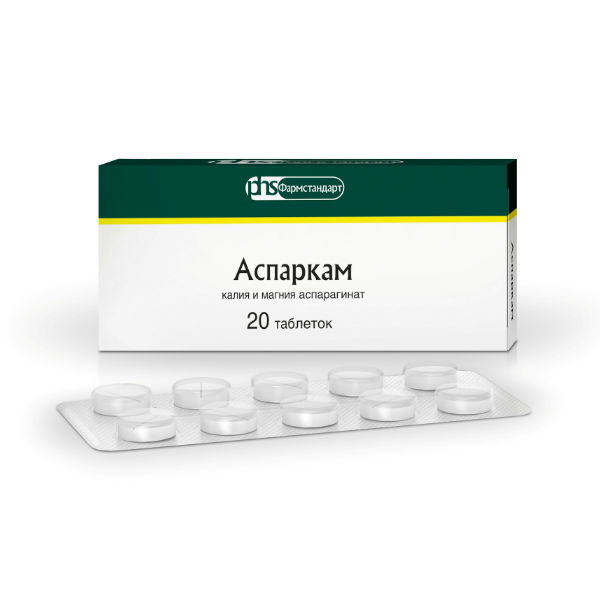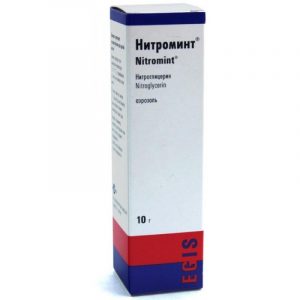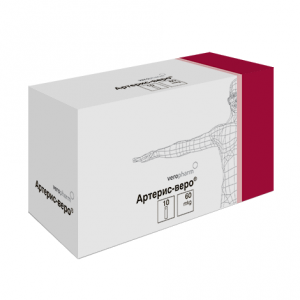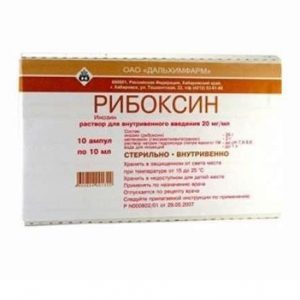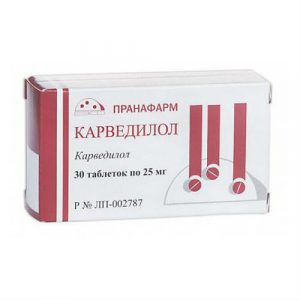Description
Latin name
Asparcam
release form
tablets
packaging 20 pcs
Pharmacological action
Asparkam is a source of potassium and magnesium ions, regulates metabolic processes. The mechanism of action is presumably associated with the role of asparaginate as a carrier of magnesium and potassium ions in the intracellular space and the participation of asparaginate in metabolic processes. Thus, aspartame eliminates the imbalance of electrolytes, reduces the excitability and conductivity of the myocardium (moderate antiarrhythmic effect).
Indications
Asparkam is used in combination therapy for heart failure, coronary heart disease, hypokalemia, cardiac arrhythmias (in the course of the disease). .
Contraindications
Hypersensitivity to the drug, impaired amino acid metabolism, arterial hypotension. Acute and chronic renal failure, hyperkalemia, hypermagnesemia, impaired atrioventricular conduction (AV block I-III art.), Severe myasthenia gravis, acute metabolic acidosis, dehydration (exicosis), hemolysis, Addison’s disease, oliguria, anuria.
Precautions: during pregnancy and lactation, in the presence of hypophosphatemia, urolithic diathesis (associated with impaired exchange of Ca2 +, Mg2 + and ammonium phosphate).
Special instructions
In case of rhythm disturbances in combination with AV blockade, it is not recommended to prescribe the drug. The combined use of Asparkam and potassium-sparing diuretics increases the risk of hyperkalemia.
Composition
Composition per tablet
active ingredients:
magnesium asparaginate tetrahydrate – 175 mg, potassium asparaginate hemihydrate – 175 mg
excipients: potato starch – 14 mg, corn starch -127 mg, talc – 5 mg, calcium stearate – 4 mg
Dosage and administration
Asparkam is prescribed orally after a meal.
Usually prescribed to adults, 1-2 tablets 3 times a day. The course of treatment is 3-4 weeks. If necessary, repeat the course.
Side effects
From the digestive system: possible nausea, vomiting, diarrhea.
From the cardiovascular system: myocardial conduction disturbances are possible.
From the central nervous system: dizziness.
Drug Interactions
Asparkum lowers sensitivity to cardiac glycosides.
Overdose
Symptoms: hyperkalemia and hypermagnesemia.
Treatment: in / in calcium chloride if necessary – hemodialysis and peritoneal dialysis.
Storage Conditions
Store in a dark place at a temperature not exceeding 25 ° C.
Shelf life
2 years
Active ingredient
Potassium and magnesium asparaginate
Conditions for dispensing from pharmacies
Without a prescription
dosage form
tablets
Prescribing
Prescribing
For the prescribed doctor , For pregnant women prescribed by a doctor, For adults prescribed by a doctor
Pharmstandard-Leksredstva, Russia
